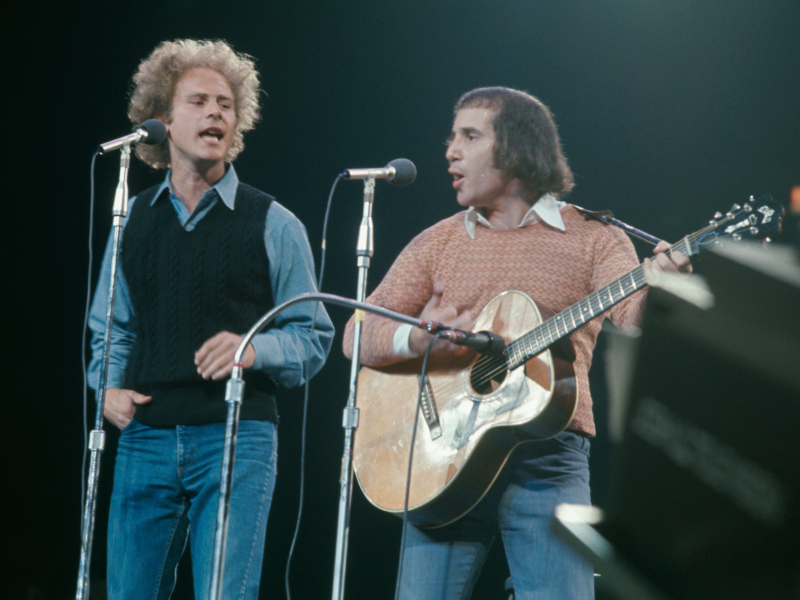Il y a 55 ans : Simon & Garfunkel sortent « Bookends ».
Il y a 55 ans aujourd’hui (le 3 avril 1968), Simon & ; Garfunkel sortaient leur quatrième album, Bookends. L’album sortait après le succès des chansons du duo dans le film à succès de Mike Nichols, The Graduate (1967), dont la bande originale est restée en tête des hit-parades pendant neuf semaines consécutives. Bookends a été propulsé par l’énorme succès numéro un de Simon & ; Garfunkel au printemps, « Mrs. Robinson », qui était de loin le plus grand succès du duo à ce jour.
Bookends, sorti la veille de l’assassinat du Dr Martin Luther King Jr. à Memphis, a suivi la bande originale de The Graduate à la première place le 25 mai 1968, pour la première de sept semaines non consécutives. Bookends est immédiatement considéré comme un chef-d’œuvre de la production discographique moderne et un signe culturel de son époque.
L’album, qui comprenait des standards instantanés écrits par Paul Simon tels que « America » et « Old Friends/Bookends Theme », n’était en réalité qu’un demi nouvel album, complété par les récents singles non LP du groupe – « A Hazy Shade Of Winter » (#13) de 1966 et « At The Zoo » (#16) et « Fakin’ It » (#23) de 1967.
Art Garfunkel nous a rappelé comment « Mrs. Robinson » a failli ne pas devenir le thème de The Graduate : [“I remember meeting at a soundstage Paul and I and (director) Mike Nichols and talking about what will go in that scene. And I said to Mike, ‘Y’know, Paul is in the middle of writing a song called ‘Mrs. Roosevelt’ which he’s about to give up on, he doesn’t like it. But ‘Mrs. Roosevelt’ could be ‘Mrs. Robinson.’ And we all looked at each other and thought, ‘Yes, it could. That should do it.’”] (:17 OC : . . . devrait le faire)
Garfunkel nous a éclairés sur la première version de « Mrs. Robinson » qui apparaît dans The Graduate : [“We recorded it that afternoon even though it hadn’t been fully written, that’s why you see in the film (sings) ‘do do do do do dee dee dee dee da’ — there are no words written yet.”] (:09 OC : . . . mots écrits)
Paul Simon a récemment expliqué la magie qui se cache derrière le son classique de Simon & ; Garfunkel : [“With Simon & Garfunkel, we would sing a take together on mic — on one mic. And when we got the take that we wanted, then we would double it individually. I would sing my part individually on mic, and Artie would sing his individually on mic. And when you combine them together, and they would be, y’know, perfectly in sync; that’s what Simon & Garfunkel sounded like. That’s what the sound was.”] (:23 OC : . . . le son était)
Peu avant sa mort en 2012, le légendaire DJ new-yorkais Pete Fornatale – auteur du livre Simon And Garfunkel’s Bookends – a rappelé qu’à la fin de l’année 1968, la célébrité de Simon & ; Garfunkel avait franchi les frontières générationnelles, de la même manière que la musique des Beatles l’avait fait : [“This was the point where the perfect storm had happened, and Simon & Garfunkel were taken from a very formidable level of success into the stratosphere. The soundtrack from The Graduate, (the) Bookends (album) — all these new fans, older fans, moms and dads discovering them by going to the movies to see one of the great motion pictures of the ’60s. That brought a whole new audience into the tent, and they were ready to consume anything by Simon & Garfunkel that was out there.”] (:30 OC : . . . était là)
Fornatale explique ensuite comment Simon & Garfunkel ont réussi à conquérir le cœur et l’imagination de toute une génération, et même plus : [“The true test of art is whether it speaks as eloquently to succeeding generations as it did to the generation to which it was originally intended. And with that in mind, all you’ve got to do is to listen to ‘Old Friends’: ‘How terribly strange to be 70’ — for Paul and Art, back then it was 44 years away. So, the soundtrack sold well, Bookends sold well, and it even carried on it’s coattails Parsley, Sage (Rosemary & Thyme) back on the charts. Y’know, there were a couple of weeks there when Simon & Garfunkel had the top three albums (laughs) in the country! That has never been done. . . that was an accomplishment of what I call “Beatlesque” proportions”] (:37 OC : . . . appeler les proportions Beatlesque)
On a demandé à Paul Simon, qui est toujours séparé d’Art Garfunkel, s’il se remémore souvent l’époque de Simon & Garfunkel : [“I don’t spend a lot of time thinking about Simon & Garfunkel, but given the span of years of my career, it’s only a. . . it’s a relatively small proportion. So, y’know, nothing feels like ancient history. It’s one of the cliches of getting older, is like, you remember everything as if it just happened.”] (:16 OC : . . . c’est arrivé)



